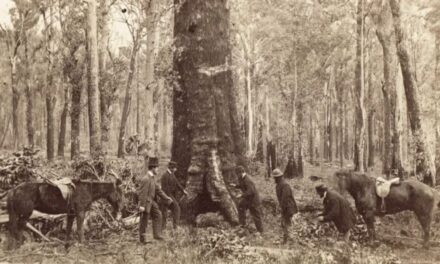Arie Baelde
On Thursday October 20, 1853 Edward Stone Parker, member of the Victorian Legislative Council moved that a select committee be appointed to take evidence and report “….on the alarming increase and destructive effects of intemperance in this Colony generally; and on the best mode of restraining the progress of such intemperance by Legislative enactments or otherwise.”
E S Parker was the former Assistant Protector of Aborigines for the northern district, based at the Larnebarramul Aboriginal Reserve in Franklinford, until 1850 when the Protectorate was abolished. He then took up farming on the former reserve. It appears that the government saw Parker, a Wesleyan minister, as eminently qualified to deal with matters of public morality.
The committee examined the operation of the “Maine Law of 1850” which resulted in Maine becoming the first “dry” state in America. A witness with experience of the “Maine law” was repeatedly probed about the tendency for proponents of the bill to be subsequently voted out of office. Eager to avoid a similar fate, members of the committee recommended “that the prohibition of the manufacture and sale of spirits be considered” but noted that such a law could only be effectively carried out with “the approval and support of the community generally”.
Some recommendations were to have an enduring impact: publicans were prohibited from serving alcohol to an habitual drunkard on penalty of forfeiting their licence. This resulted in a language of denial tacitly agreed between publican and drinker that was to feature in court proceedings and inquests into deaths well into the 20th century. Common phrases included “quite sober”, “not sober but not drunk” and “somewhat the worse for drink but still capable of taking care of himself”. Publicans rarely lost their licence so it seems that anyone able to bring a glass to their lips was “still capable of taking care of themselves”.
The committee were also impressed with the evidence of Reverend William Cox Currey of Castlemaine. The Reverend was particularly irked by drinking on the Sabbath. “I also object very strongly to Sunday selling,” he said. “I never saw such a state of things on the Gold Fields before. Men passing along from the public houses wanting to fight the parson!” And so Sunday trading was ended in 1854.
In December 1876, the licensing bench sat at the Blackwood Police Court and granted sixteen hotel licences. However, the police objected to the application of one Mary Ann Maher for the Family Hotel in Barry’s Reef on the grounds that the “house was not required” as there was one hotel for every twenty five drinkers in Barry’s Reef. In addition, Constable Hawkes claimed that Mary Ann was not a “not a fit and proper person as she had been fined twice in six months for using obscene language”. The application was refused.
It should be noted that the previous Family Hotel licensed to Thomas Maher burned down in January 1875 after a fire jumped from the Sultan Hotel next door. The fire occurred when Captain Reid, a drunk live-in miner accidentally set the house alight with a candle. Captain Reid did not survive the fire even though according to the inquest he was “the worse for liquor”, but ” still capable of taking care of himself”. The Sultan was insured for 400 pounds but the Family Hotel was uninsured which no doubt led to the bankruptcy of Thomas and the need for Mary Ann to apply for a licence instead.
Next the court heard the application for the North Sultan Hotel. This was unopposed by the police but now Messers Williams, Scales and Donnetburne rose “on behalf of a body of ratepayers to oppose it on the grounds that the house was not wanted”. It was only about 400 yards from another public house and they thought the nine public houses for an adult population of 800 was quite sufficient. “After a long and patient hearing of statements from both sides, the bench refused the application.”
We now move to Daylesford in September 2022. In contrast to the Blackwood hearings, the licence application for a Dan Murphy’s outlet will be held some two hours drive from Daylesford and presided over by people who are not part of the community. The applicant is not a person who is part of the community and any profits from the business will primarily be distributed outside the Shire. Like the Blackwood case however, any potential harm or detriment will mainly fall within the Daylesford community.
Fortunately the community is not bereft of options should Dan Murphy’s be granted a licence. Public education was one avenue taken by the Blackwood community. In the Mechanics Hall, the Band of Hope Juvenile Temperance Society meeting was entertained by, among others, the recitation of “Snoring in the gutter” by Miss E Kelley and the choir sang “Courage Brethren”. Salvation Army bands still exist and they may be invited to perform in front of Dan Murphy’s, reviving old 19th century favourites such as “Storm the forts of Darkness” and “Away, away with Rum”.
Arie Baelde lives at Musk Creek. He is only very occasionally the worse for drink and does not hold any shares in the ‘Syndicated Irishman’.





